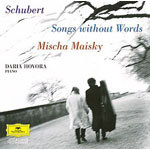
Songs without Words; Arpeggione Sonata D 821
 $31.50
Out of Stock
$31.50
Out of Stockadd to cart
SCHUBERT
Songs without Words; Arpeggione Sonata D 821
Mischa Maisky (cello) Daria Hovora (piano)
[ Deutsche Grammophon / CD ]
Release Date: Saturday 6 November 2004
Cellist Mischa Maisky now presents a recording of his own arrangements of songs by Schubert in which he is accompanied by Daria Hovora.
Continuing his well-established and successful recordings of shorter and encore-style works for Deutsche Grammophon [Meditation (CD 431 544-2) - "In its field a total winner" (Gramophone) - Adagio (CD 435 781-2) (with Semyon Bychkov and the Orchestre de Paris) and Cellissimo (CD 439 863-2) (with Daria Hovora)], cellist Mischa Maisky now presents a recording of his own arrangements of songs by Schubert in which he is again accompanied by Daria Hovora.
Mischa Maisky has been playing Schubert's Arpeggione Sonata since his teens. It is one of his favourite works and he performs it frequently in concert. "I enjoy it very much, I think it is gorgeous", says Maisky, who considers it to be one of the most difficult pieces for cello: "It is technically very challenging. It is one of those pieces that no matter how much you perform it, even if you have been playing it all your life, you have to be in the best shape and you have to be prepared for surprises! It is very demanding and very dangerous!"
Schubert is one of Maisky's favourite composers, and with the anniversary of the composer's birth approaching in 1997 he wanted to do something "from my side" to celebrate it. In addition to the Arpeggione Sonata this new disc features a series of cello arrangements of the composer's songs "without words". Maisky says, "There are so many wonderful songs by Schubert, and for years I have wanted to make a disc of arrangements." The decision was made to couple them with the longer sonata work, making a disc that presents both sonata and songs in a new light. Says Maisky, "I very much liked the idea of mixing a sonata with a set of shorter encore pieces. There are a number of major composers who wrote one sonata, like Rachmaninov, Grieg, Richard Strauss, Chopin and so on, and in such cases it makes sense to combine the sonata with the short works as we do here."
Asked how he went about selecting the Schubert songs for this new disc, Maisky replied: "I almost went crazy! I had had the idea at the back of my mind for years, but I had never had time to make a concrete selection of songs until we were planning this recording. I was sure that out of the more than 600 songs which Schubert wrote it would be easy to find plenty for a single CD. But it was not nearly as easy as I thought." Maisky studied Schubert's entire song output, eliminating those that were clearly not suitable for cello. After making a short list of potential candidates for inclusion in the recording, he began to try them out on the instrument. "I was basically working 24 hours a day. During the night while sleeping I was dreaming of songs non-stop. It was very difficult because I underestimated the importance of the texts to many of these songs. Eventually I ended up with a list of only about 30 that seemed to fit the cello well, and which also functioned well without the texts." After more playing and experimentation, Maisky eventually ended up with the 14 songs actually included on this recording. The final selection is made up of those that he liked most, and which fitted best the demands of the instrument.
Mischa Maisky is frank about the fact that he does not expect his cello versions of Schubert songs to compete with those by singers. "Of course I think that the human voice is the most perfect instrument. But the cello has certain advantages as well ... for example, it is sometimes possible to play a passage an octave higher when it is repeated. And in many cases there is no human voice that can do that!" Does he think about the words of the songs while playing? "No!", says the cellist. "I have read the texts many times, and of course it is very important to know them well. But when I play I don't think about them, because the music is so expressive that it has a life of its own which one can enjoy and appreciate without the texts. In that sense I agree with the German Romantic poet Heinrich Heine who said that where words leave off music begins." Maisky has played several of the songs as encores and they have always proved popular.
In the event, the disc features several songs from three of Schubert's greatest song cycles - Die schöne Müllerin, Die Winterreise and Schwanengesang - as well as a number of well-known songs such as An die Musik. Does the cellist find it difficult to play arrangements of such extremely well-known songs? "Actually yes", Maisky replies. "When you do these songs that everyone knows and where there are so many wonderful interpretations by great singers, it is even more demanding and a greater responsibility."
Tracks:
Sonata for Arpeggione and Piano in A minor, D.821
Die schöne Müllerin, D.795: Der Neugierige
Nur wer die Sehnsucht kennt, D.877 No.4 (Mignons Gesang, 4th ver sion)
Winterreise, D.911: Täuschung & Der Leiermann
Nacht und Träume, D.827
Schwanengesang, D.957 (Cycle): Am Meer (Heine)
An die Musik, D.547 (Op.88/4)
Die Forelle, D.550 (Op.32)
Ständchen "Leise flehen meine Lieder"
Der Einsame, D.800
Die schöne Müllerin, D.795: Der Müller und der Bach
Heidenröslein, D. 257 (Op.3/3)
Litanei auf das Fest Allerseelen, D.343
Du bist die Ruh', D.776 (Op.59/3)
